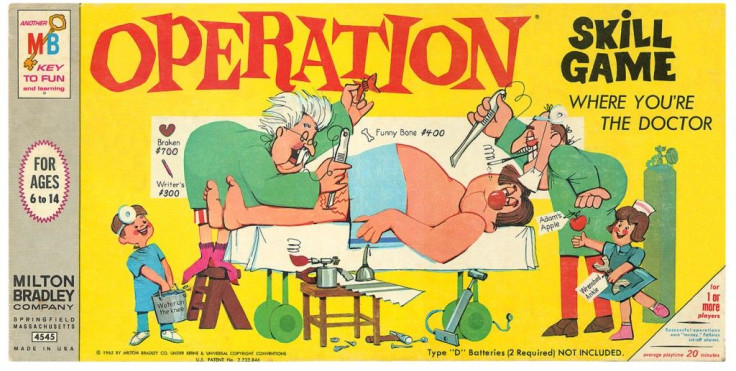'Operation' Board Game Inventor Crowdfunds His Own Operation

If you soured on crowdfunding after an ironic Kickstarter campaign received over $55,000 to make potato salad, here's a story that will restore your faith in the concept. The inventor of the beloved children's game Operation will be able to afford a much-needed operation of his own: $25,000 worth of oral surgery.
In 1965, John Spinello, then a 20-year-old industrial design student at the University of Illinois, sold a game idea to a toy invention company that ended up licensing it to Milton Bradley. The game Operation -- "the wacky doctor game where you're the wacky doctor" -- became a hit and spawned licensed products as well. Spinello was paid a mere $500 for the project.
Spinello, who ran a trucking warehouse company, later fell on hard times. He and his wife filed for bankruptcy, and his insurance didn't cover the $25,000 he needed for oral surgery, reports the New York Times.
Two game inventors and friends, Tim Walker and Peggy Brown, started a crowfunding campaign on Crowdrise.com on Oct. 22 that raised almost $32,000 on Spinello's behalf by Monday morning. In a campaign that preceded the crowdfunding effort, Walker and Brown invited those who loved and enjoyed Operation as kids to write Spinello a thank you note with $3 via ILoveOperation.com, where they could also purchase signed Operation games.
“I’m autographing games as fast as they come in," said Spinello in a video on the site. "I couldn’t be happier. I hope I get writers’ cramp.”
Operation features the red-nosed “Cavity Sam,” who lies on an operating table as players take turns operating on him. The object of the game is to place a metal wand into his various cavities to fish out a "spare rib" or "funny bone" without touching the metal edges of the openings. If players touch the sides of the metal, a loud buzzer goes off and Sam's nose lights up.
In a video about his deal with the toy invention firm, Spinello says he accepted the $500 because he was also promised a guaranteed job when he graduated. That job never materialized. And he never received any royalties, although he owns the patent.
Spinello and his wife hope to use any funds that exceed the amount he needs for his surgery to go toward saving his house. Hasbro, which owns Milton Bradley, agreed to buy the original prototype from Spinello to help defray his costs, reports the New York Times.
© Copyright IBTimes 2025. All rights reserved.






















